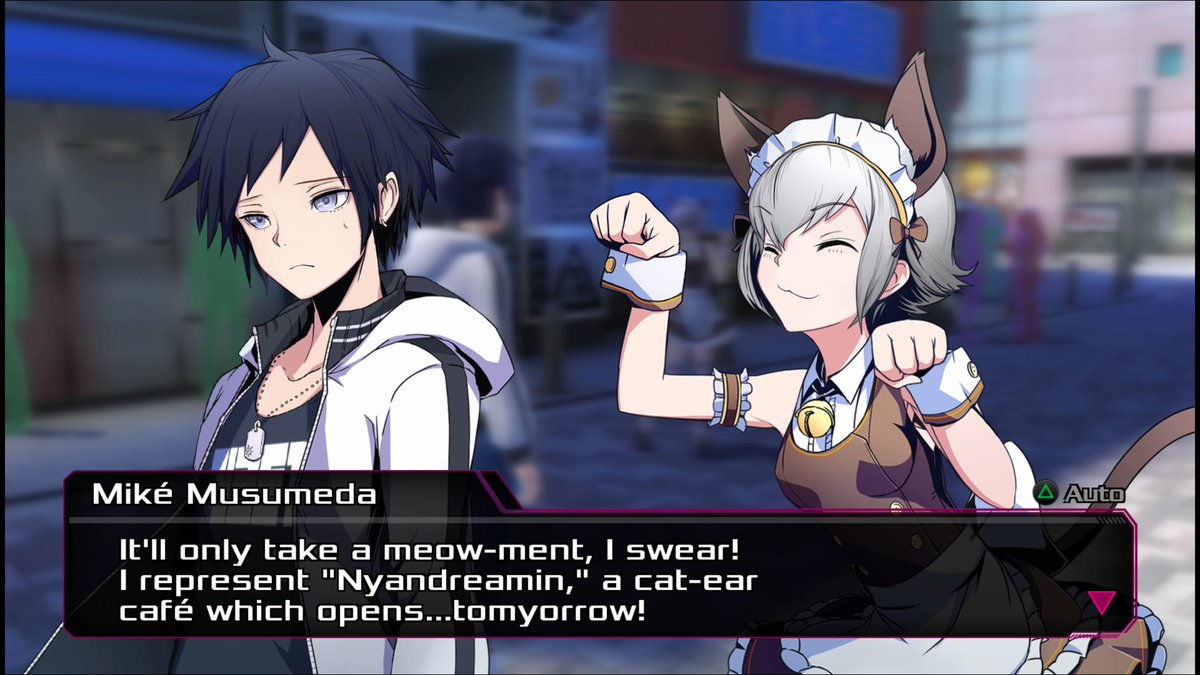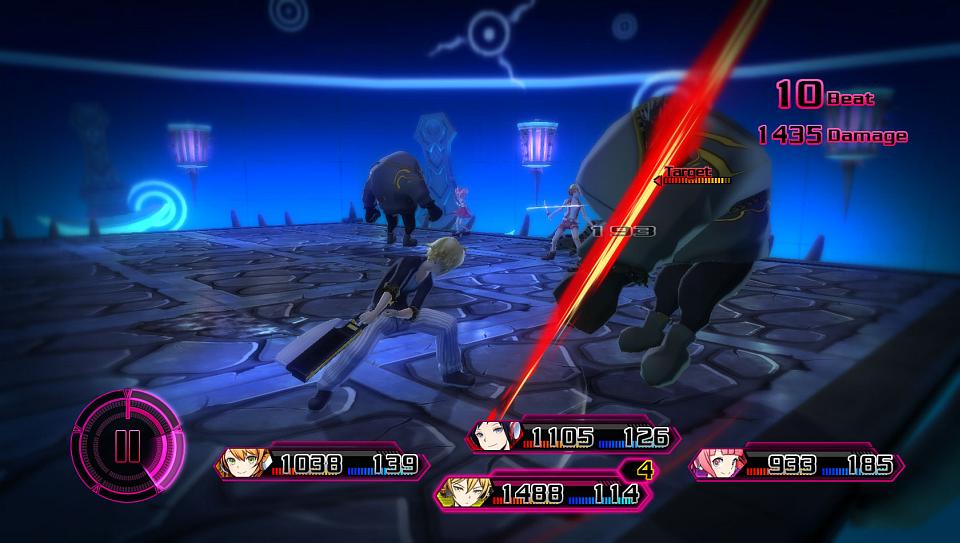Search
[{{{type}}}] {{{reason}}}
{{/data.error.root_cause}}{{{_source.title}}} {{#_source.showPrice}} {{{_source.displayPrice}}} {{/_source.showPrice}}
{{#_source.showLink}} {{/_source.showLink}} {{#_source.showDate}}{{{_source.displayDate}}}
{{/_source.showDate}}{{{_source.description}}}
{{#_source.additionalInfo}}{{#_source.additionalFields}} {{#title}} {{{label}}}: {{{title}}} {{/title}} {{/_source.additionalFields}}
{{/_source.additionalInfo}}- Details
- Category: Vita
- By Cheryl Gress
- Hits: 5436
Akiba’s Beat (Vita)

Akiba’s Beat
Developed by: Acquire
Published by: XSEED Games
Release date: May 16, 2017
Available on: PS4, Vita
Genre: Action RPG
Number of Players: Single-player
ESRB Rating: Teen for Blood, Fantasy Violence, Mild Language, Suggestive Themes, Use of Alcohol
Price: $29.99
(Amazon Affiliate Link)
Thank you XSEED for sending us this game to review!
What are delusions? Are they merely wishes? Are they mankind’s true joy? What if delusions became reality? Akiba’s Beat explores that possibility as delusions begin to appear and multiply throughout Akihabara. As an added twist, the day Sunday begins repeating and everything has to get set straight. But at what cost?
The main character, Asahi, is a self proclaimed NEET (Not in Education, Employment, or Training) and wears a shirt saying as much. He meets up with a chosen one named Saki who teaches him how to enter into delusionscapes and eradicate them in an attempt to get Akihabara back to normal. Saki has a floating familiar who stays by her side and his name is Pinkun. He likes to call out Asahi for being lazy and often refers to him as a dingus.
Nullifying delusions involves exploring all of their levels, which are often crawling with enemies. When you make it to the bottom floor, you’ll find a grand phantasm/final boss that needs to be dealt with. Those who unknowingly create the delusions are referred to as delusers and they forget all about their altered reality and return back to normal after the grand phantasm is defeated. Sometimes the people adjust well to entering back to reality, but that’s not always the case. The later instances cause Asahi and some his friends to wonder if they are doing the right thing by destroying people’s delusions.

Strong Points: Good story, localization; likable characters
Weak Points: Long and plentiful loading screens; repetitive delusionscapes/dungeons; lackluster battles; crashes; slow performance
Moral Warnings: Violence and bloodshed; cursing (*ss, b*stard, b*tch; d*mn), blaspheming; sexual dialogue; transgender and cross dressing characters; drinking and drunkenness
There is a lot of soul searching and some good lessons about friendship woven into this adventure. In total there are sixteen chapters and most of them have sub quests that allow you to learn about and help out your companions. Many of the side quests involve finding the right kind of food to satisfy various cravings. Time only progresses when you complete the main story quests though. Each day is broken down into day, twilight, night, and midnight.
The town map is broken down into several sections and if you walk through all of them without teleporting, you will hate this game in a hurry. There are tons and tons of loading screens and some of them take longer than others. When traveling throughout the town be sure to use the map and warp yourself to the closest save point to your current objective. I like how most of the objectives are marked on the map, but those that take place in Violet Eden or inside of a delusionscape won’t be seen.
Besides experiencing the character development and good storytelling, the sub quests are a good way to acquire some loot and money for upgrades. Each character can wear various accessories and clothing items that enhance their attributes like attack, defense, and so on. I tended to equip neutral items, but there are elemental ones that are strong against some elements while being weak to others.
The battle system is music based and chain attacks are referred to as beats. To charge up your powerful attacks you have to do normal ones and after your music meter is charged, you can switch to a more powerful mode that doesn’t have a limit on how many times you can attack before needing a break. I’m not a fan of the battle system and am thankful that you can adjust the difficulty of the battles mid-game. The difficulty levels are easy, normal, hard, and imagine.
The power of your party’s attacks depends on the computer parts that everyone has equipped. Some computer parts like CPUs and hard drives are universal, but each member has a particular kind of memory/RAM that they need. As you progress in the game more powerful computer and clothing items will become available. Be sure to visit the many shops along the way to have an edge against the enemies awaiting you.

Higher is better
(10/10 is perfect)
Game Score - 70%
Gameplay - 13/20
Graphics - 7/10
Sound - 8/10
Stability - 2/5
Controls - 5/5
Morality Score - 56%
Violence - 4.5/10
Language - 1/10
Sexual Content - 6/10
Occult/Supernatural - 8.5/10
Cultural/Moral/Ethical - 8/10
There’s not a whole lot of variety of enemies and the similarly styled ones tend to have the same weaknesses of their lesser powerful equivalents. The bosses were all unique though. It’s worth noting that the framerate noticeably tanked during some of the boss battles. The delusionscapes have different themes and many of them have various gates or teleporters that have to be used in the proper order to successfully explore them. I didn’t mind completing the dungeons once, but you have to traverse them multiple times between the main story, sub quests, and bounty hunts. If you like fighting, a “Might Club” becomes available later in the game and you can battle individually or as a group for money.
With fighting comes violence and most of it is bloodless. There is a cold blooded murder in the game and you’ll see blood splatter and the screen will go red when a certain character is literally backstabbed. Suicide is also touched upon in the story and your party tries to prevent one repeatedly which gets taxing with the looping Sunday.
One of the hangouts for the group is a queen bar which is run by a (now) female named Akemi. With a bar comes drinking and many characters are seen consuming alcohol and getting tipsy as a result. As for the theme of the bar, Akemi is hardly alone since there are multiple characters who cross dress in this title. While there is no intimacy seen, there are some sexual situations and dialogue regarding unwanted advances.
There is reference to this world being godless and one of the characters take it upon himself to become a god and grant people’s wishes. I find this concept interesting since I don’t see my savior as a mere genie. Sadly, there are several instances of blasphemy and cussing throughout the game. In the end, I enjoyed the concept and character development in Akiba’s beat. The fighting and loading screens are a point of contention and then there are the moral issues to take into consideration. If you don’t mind any of those, this game will keep you busy for over thirty hours. Keep in mind that at least three of them will be loading screens though.






